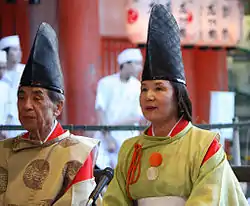烏帽子
Japanese
| Kanji in this term | ||
|---|---|---|
| 烏 | 帽 | 子 |
| え Jinmeiyō |
ぼう > ぼ Grade: S |
し Grade: 1 |
| kan’yōon | kan’on | |
Etymology
Shift from older reading ebōshi, itself a compound of 烏 (e, “crow, raven”, in reference to the black color) + 帽子 (bōshi, “cap”).[1][2][3]
Pronunciation
Noun
Derived terms
Types of Eboshi
- 翁烏帽子 (okinaeboshi)
- 折烏帽子 (orieboshi)
- 風折烏帽子 (kazaorieboshi)
- 静烏帽子 (shizukaeboshi)
- 立烏帽子 (tatēboshi)
- 萎烏帽子 (naēboshi)
- 梨子打烏帽子 (nashiuchieboshi)
- 納豆烏帽子 (nattōeboshi)
- 引立烏帽子 (hikitatēboshi)
- 左眉烏帽子 (hidarimayueboshi)
- 平礼烏帽子 (hirēboshi)
- 細烏帽子 (hosoeboshi)
- 右眉烏帽子 (migimayueboshi)
- 揉烏帽子 (momieboshi)
- 諸眉烏帽子 (moromayueboshi)
Derived terms
- 烏帽子下 (eboshishita, “in kabuki theater, a wig worn under an eboshi cap”, literally “under the eboshi”)
- 烏帽子花 (eboshibana, alternative name for the 都草 (miyakogusa) (Lotus corniculatus, syn. Lotus japonicus), literally “eboshi flower”)
- 烏帽子貝 (eboshigai, “the smooth gooseneck barnacle, Lepas anatifera”, literally “eboshi shellfish”)
- 烏帽子岩 (eboshi iwa, a placename for various naturally occurring crags of a shape similar to an eboshi cap, literally “eboshi crag or rock”)
- 烏帽子魚 (eboshi uo, alternative name for the 鰹 (katsuo): skipjack tuna, Katsuwonus pelamis, literally “eboshi fish”)
- 烏帽子懸 (eboshi kake, “the strap or cord of an eboshi cap, running under the wearer's chin; a nail or peg for hanging an eboshi cap”, literally “eboshi hanger”)
- 烏帽子始 (eboshi hajime, “the first time a young man wears an eboshi cap after coming of age; a coming of age ceremony”, historical, literally “first-time eboshi”)
- 烏帽子子 (eboshigo, “a man from a samurai family who has received his adult name after his coming of age ceremony”, historical, literally “eboshi child”)
- 烏帽子止 (eboshi todome, “a hatpin used with an eboshi cap”, literally “eboshi stopper”)
- 烏帽子首 (eboshi kubi, “the head of someone of a status high enough to wear an eboshi”, literally “eboshi head”)
- 烏帽子親 (eboshi oya, “someone who stands in for the boys parent as the officiant at a coming of age ceremony”, literally “eboshi parent”)
- 烏帽子折 (eboshi ori, “the making of an eboshi cap; a maker of eboshi caps”, from the way the top of the hat would be folded, literally “eboshi folding, eboshi folder”)
- 烏帽子着 (eboshigi, “a boy's coming of age ceremony”, historical, literally “eboshi wearing”)
- 烏帽子鳥 (eboshidori, “the Knysna turaco or Knysna lourie (Tauraco corythaix), a bird native to South Africa”, from the way the crest shape resembles an eboshi cap, literally “eboshi bird”)
- 烏帽子直衣 (eboshi nōshi, “simplified noble dress, consisting of 直衣 (nōshi, “everyday wear”) and an eboshi cap”, literally “eboshi everyday wear”)
- 烏帽子髪 (eboshigami, “the traditional hairstyle used when wearing an eboshi cap”, literally “eboshi hair”)
- 烏帽子付 (eboshizuke, “the wearing of an eboshi cap; during the late 1600s, a kind of community poetry wherein one person would post the first line of a haiku, and others would add the second and third lines”, from the way that the top of the haiku is the first part posted, literally “eboshi adding”)
- 烏帽子宝 (eboshidakara, “someone as close and dear as one's own eboshi cap”, literally “eboshi treasure”)
- 烏帽子名 (eboshi na, “a man's adult name, received at a coming of age ceremony”, historical, literally “eboshi name”)
- 烏帽子籠 (eboshi kago, “a bamboo basket shaped like an eboshi cap; a traditional fire bucket made from such a basket”, literally “eboshi basket”)
- 烏帽子鑽 (eboshi tagane, “a chisel with a narrow and thick blade, used to cut grooves”, from the shape's similarity to an eboshi cap, literally “eboshi chisel”)
- 烏帽子鯛 (eboshidai, “the man-of-war fish or bluebottle fish, Nomeus gronovii”, literally “eboshi sea bream, eboshi red snapper”)
- 鰹の烏帽子 (katsuo no eboshi, “the Portuguese man-of-war (Physalia physalis), a kind of marine hydrozoan visually similar to a jellyfish”, from the shape of the gas bladder and the way that skipjack tuna can be found nearby, literally “skipjack tuna's eboshi cap”)
References
- Shōgaku Tosho (1988) 国語大辞典(新装版) [Unabridged Dictionary of Japanese (Revised Edition)] (in Japanese), Tōkyō: Shogakukan, →ISBN
- Matsumura, Akira, editor (2006), 大辞林 [Daijirin] (in Japanese), Third edition, Tōkyō: Sanseidō, →ISBN
- Matsumura, Akira (1995) 大辞泉 [Daijisen] (in Japanese), First edition, Tōkyō: Shogakukan, →ISBN
- NHK Broadcasting Culture Research Institute, editor (1998), NHK日本語発音アクセント辞典 [NHK Japanese Pronunciation Accent Dictionary] (in Japanese), Tōkyō: NHK Publishing, →ISBN
- Kindaichi, Kyōsuke et al., editors (1997), 新明解国語辞典 [Shin Meikai Kokugo Jiten] (in Japanese), Fifth edition, Tōkyō: Sanseidō, →ISBN
This article is issued from Wiktionary. The text is licensed under Creative Commons - Attribution - Sharealike. Additional terms may apply for the media files.
